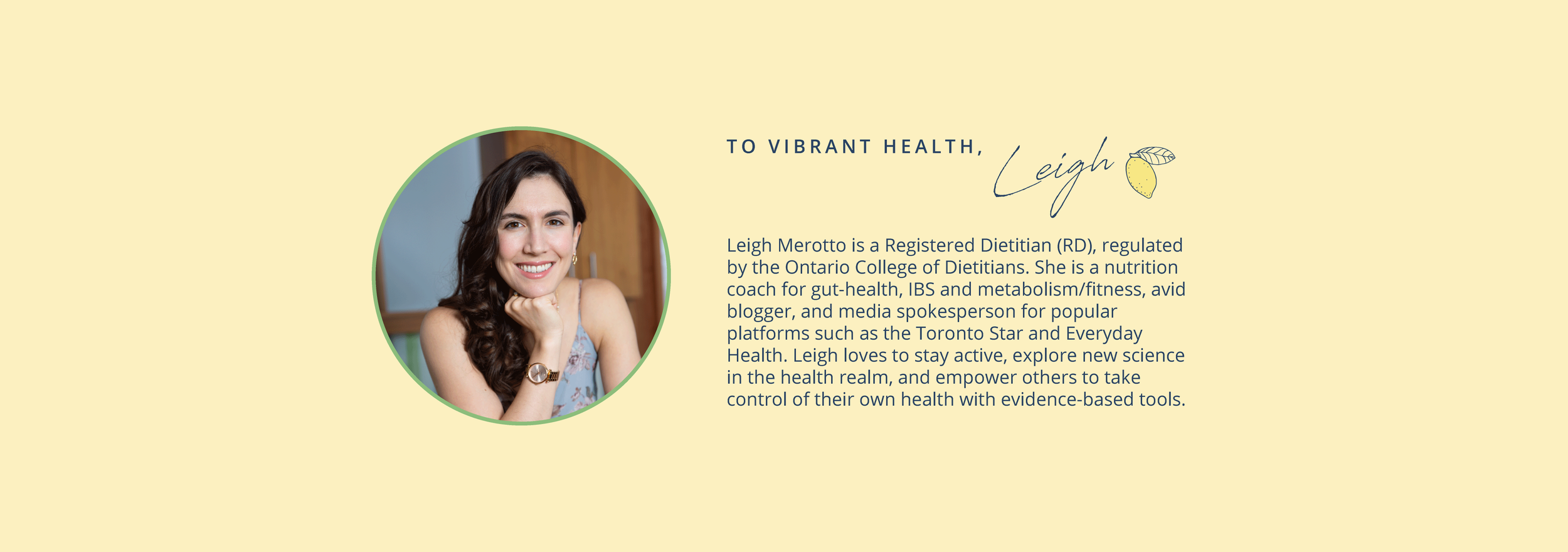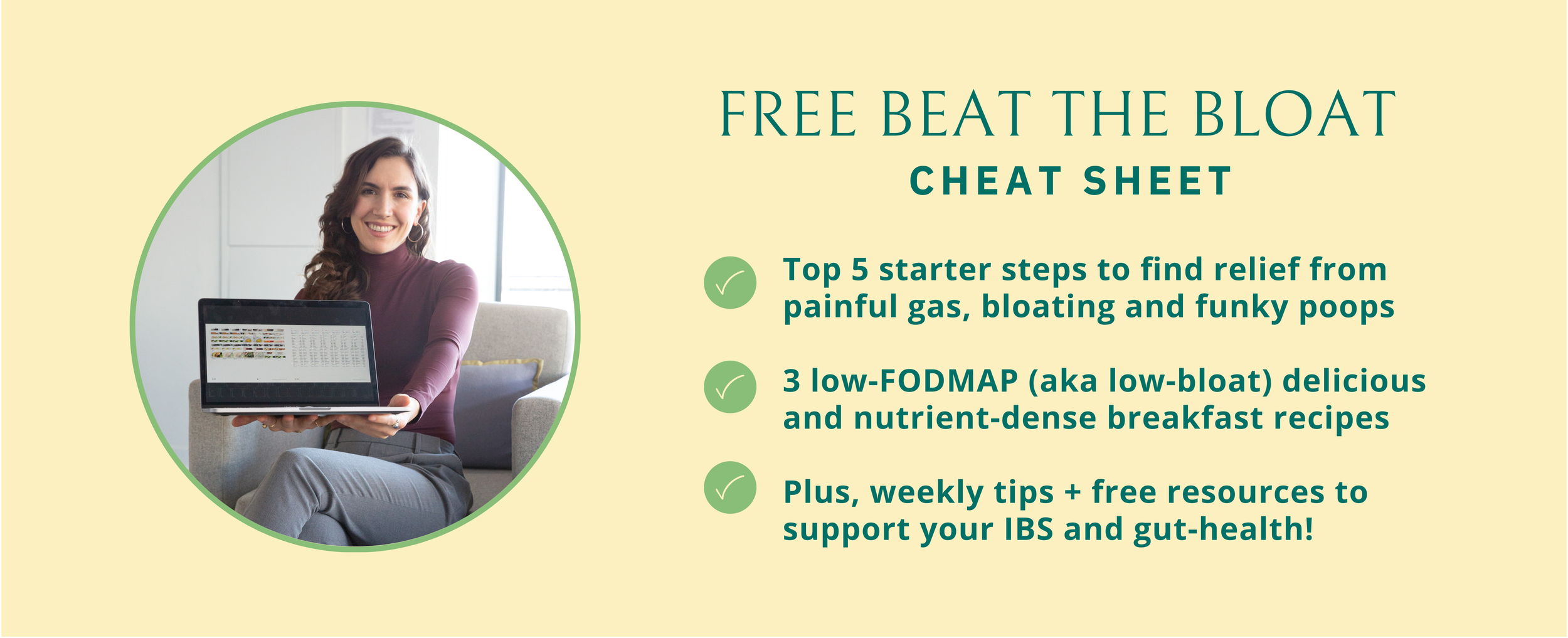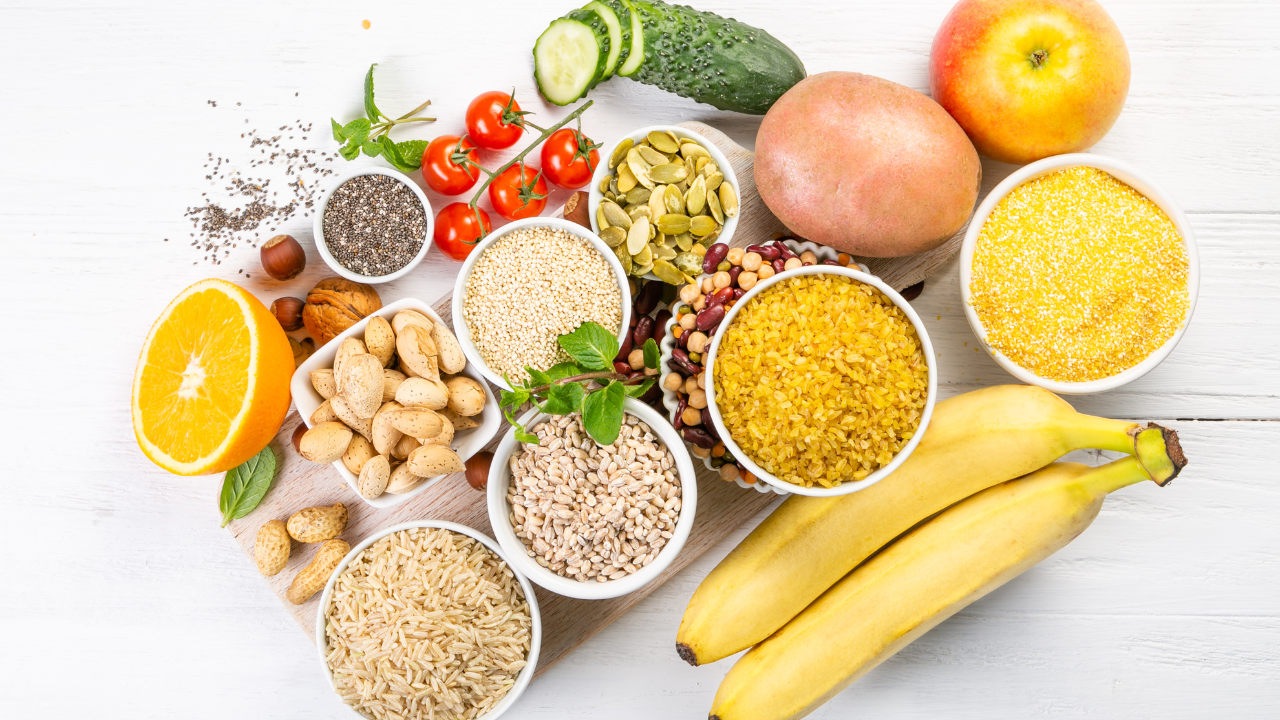Reflux and Heartburn: What It Is and Natural Shifts for Lasting Relief (Without Medication)
Do you deal with acid reflux and/or heartburn regularly? Well friend, you aren’t alone! Approximately 5 million Canadians experience reflux and heartburn symptoms at least once a week [1].
Further, those with IBS and SIBO tend to also have overlapping reflux (not a fun relationship!) These symptoms are often painful and impede our ability to perform day-to-day tasks and quality of life.
To give you a picture of the impact… In Canada alone, individuals with acid reflux and/or heartburn are absent from work 16% of each year. This results in an annual loss of $21 billion in costs [1].
For today's post, let's get into what reflux and heartburn are, and the main strategies to help remedy the pain.
What is Reflux and GERD?
Acid reflux is caused by the malfunctioning of the valve between the esophagus and the stomach. This valve is called the lower esophageal sphincter (LES) and is responsible for 2 main functions: to allow food to enter the stomach and to prevent food and stomach secretions from flowing back into the esophagus.
The latter of the functions is important as stomach secretions are very acidic and contain digestive enzymes; when these secretions enter the esophagus, they can damage the esophageal lining and cause symptoms such as:
Heartburn (we will be talking about heartburn more later)
Sour taste in the mouth due to the acidity of the stomach secretions
Bad breath
Hoarse voice
Consistent coughing or hiccuping
GERD, aka, gastroesophageal reflux disease is a more severe and frequent form of acid reflux. It can also be further categorized as non-erosive reflux disease (NERD) or erosive reflux disease (ERD) depending on whether there is esophageal mucosal damage.
Although the cause of GERD is not known, factors associated with developing GERD include pregnancy, smoking, obesity, certain medications, etc.
This chronic form of acid reflux leads to repeated damage of the esophageal lining and if left untreated can result in result complications, including (but not limited to):
Esophagitis: chronic inflammation of the esophagus resulting in ulcers and bleeding of the lining of the esophagus. Common symptoms of this condition: difficulty swallowing, mouth sores, nausea, vomiting, heartburn, etc.
Esophageal stricture: narrowing of the esophagus resulting in difficulty swallowing.
Barrett’s esophagus: tissue of the esophageal lining is replaced by tissue similar to the intestinal lining. This may lead to esophageal adenocarcinoma, which is a rare cancer that develops in the esophagus.
Diagnosis of GERD
GERD is difficult to diagnose, as each person with GERD may present with different symptoms. Symptoms of GERD other than heartburn are chronic sore throats, constant need to clear your throat, chronic coughing, inflamed gums, etc.
As you can see - that’s a few common symptoms that overlap with other conditions such as seasonal allergies and more.
To make a clinical diagnosis (by your medical doctor), a combination of symptoms and testing methods are used.
Common testing methods are:
Upper endoscopy: an endoscope (flexible tube with a camera at the end) is inserted to the mouth and travels through the esophagus, stomach, and small intestine. This allows the physician to be able to visually see if there is any damage to the esophageal lining and if esophagitis or Barrett’s esophagus has developed
Esophagram: a contrast agent (substances that allow certain structures or tissues in the body to be more clearly seen on imaging exams such as x-ray’s, ultrasounds, etc.) is consumed by the individual and a radiologist examines the movement of the agent through the esophagus and the stomach. This method is used to determine if there is esophageal stricture
Esophageal manometry: the individual’s nose and throat is numbed, and a small tube is inserted into the nose and through the esophagus. The individual will then be asked to swallow to allow the physician to examine their esophageal function and measure the esophageal sphincter muscle pressure.
Ambulatory 24-hour pH probe: a small tube is inserted into the individual’s nose and into the esophagus at the same level of the LES. The pH sensor at the end of the tube measures the pH levels to determine if the esophagus has been exposed to acidic stomach secretion.
What is Heartburn?
Heartburn is a common symptom of acid reflux and GERD. It is a painful sensation that occurs in the chest, neck and throat that is caused when acid stomach secretions flow in the esophagus, damaging the esophageal lining.
Other common symptoms of heartburn include a sour taste in the mouth, coughing, and a hoarse voice.
However, other than acid reflux and GERD, it can also be triggered by certain medications, smoking, pregnancy, obesity, and consumption of:
Spicy foods (e.g., foods containing chili powder, cayenne peppers)
Foods high in fat (e.g., pizza, potato chips, fried foods, processed snacks)
Acidic foods or beverages (e.g., citrus fruits, tomatoes, coffee, chocolate)
Large meals
While heartburn is an indicator of GERD, it may also simply be due to consuming a large meal or eating too much spicy food, as well as the other contributors mentioned above.
About 20 of 100 people in Western countries have a regular heartburn. Many of these cases do not result in negative health implications, other than the associated uncomfortable symptoms.
Should You Be Concerned About Your Reflux & Heartburn?
This then leads to the question, when should you be concerned? While very infrequent (say every few months) having an episode of reflux is nothing to be concerned about (life happens and you may consume some trigger foods), if you are having frequent and painful heartburn, or heartburn at night or as soon as you wake up, this is an indicator for GERD and you should see a physician to get diagnosed.
Having reflux and heartburn regularly, even a few times per month, is not normal and is a sign something deeper is going on.
The Link Between GERD and IBS
IBS (Irritable Bowel Syndrome) is a digestive disorder of the large intestine that leads to symptoms such as abdominal pain, bloating, gas, and diarrhea. As a Dietitian who works primarily with those with IBS, I see many people with IBS experiencing reflux as well.
Although IBS and GERD affect different areas of the digestive system, there is new research suggesting overlaps between these two conditions.
In a clinical study with 1419 participants diagnosed with IBS, 63.6% of these patients also had GERD [2]. Furthermore, individuals with IBS are twice as likely to be diagnosed with GERD. Studies suggest that both IBS and GERD have similar pathophysiological mechanisms, however, further research is required to make causal links [3].
If you are interested in learning more about IBS and my management approach as a gut-health Dietitian, I have an article on that here.
Common Prescription Medications for Reflux
There are many medications that can be purchased over the counter to relieve heartburn, however these medications may only provide temporary relief if the underlying problem is not addressed.
Here are some examples of over-the-counter medications:
Antacids: these are used to relieve mild heartburn and other mild GERD symptoms. This medication works by neutralizing the acid in the stomach to prevent heartburn. Antacids are typically taken after eating, as heartburn and reflux typically occurs after meals. Furthermore, the effects may be prolonged if taken after eating. Some possible side-effects include diarrhea, constipation, nausea, vomiting, gas, and stomach cramps.
Alginic acids: forms a foam barrier to prevent acid reflux
Low-dose H2 blockers: lowers the amount of acid secretions produced by the stomach, and thus promoting the healing of the esophagus.
Proton pump inhibitors (PPIs): similar to low-dose H2 blockers, this medication reduces the amount of acid secretions produced by the stomach. However, in contrast to H2 blockers, PPIs are more effective in treating GERD symptoms and healing the esophageal lining. Possible risks of taking PPIs include headaches, diarrhea, Clostridioides difficile (C. diff) infection
As mentioned, I believe in a functional approach to managing reflux, and while medications have their time and place, they should not be easily prescribed if functional strategies have not been tried and/or the underlying cause of the reflux not addressed.
*Always consult with your doctor before making any adjustments to your medication regimen.
How Can We Relieve Reflux Without Medications?
Here are some of my top immediate and long-term strategies to help remedy the pain.
Many of these dietary and lifestyle changes have been shown to improve esophageal pH and relieve GERD symptoms.
SHORT TERM STRATEGIES:
If you experience a flare-up, these are some strategies that can help immediately:
Abdominal Stretching: Stretching your muscles and practicing deep physical movements such as yoga & stretching can reduce gastrointestinal symptoms including reflux and the associated GI pain.
Avoid the common triggers during a flare: alcohol, carbonated drinks, high fat foods, acidic and spicy foods. High fat foods are associated with reducing the pressure of the LES and increasing esophageal acid exposure, while acidic and spicy foods can cause direct esophageal mucosal irritation. Furthermore carbonated drinks may cause you to burp and allow acidic stomach secretions to flow into the esophagus.
Diaphragmatic Breathing: This can help support your gut-brain connection and relax your esophageal sphincter (research shows it really works!). This method was shown to reduce the amount of reflux that occurs after eating by increasing the pressure difference between the LES and gastric pressure.
Elevate your head 6 to 8 inches higher than your feet when you go to bed. Elevation of the head results in elevation of the area where the esophagus and stomach meet, thus preventing the entrance of acidic stomach secretions into the esophagus.
Ginger: This amazing root can help relieve the nausea and pain associated with reflux and heartburn. Additionally, a study shows that taking ginger supplements may reduce the inflammation that occurs throughout the lining of the esophagus. However, avoid consuming more than 4g of ginger throughout the day, as larger doses can result in greater heartburn [4].
LONG TERM:
Occasional reflux may occur, and you may wish to use the strategies above. However, as mentioned if it is happening more than a couple times per year, you may want to look deeper into the issue and address what is really going on. Often there may be other issues with gut-health that can be addressed through diet and nutrition changes. Further, having frequent reflux can lead to esophageal damage which we do not want to leave untreated.
Avoid eating large meals: Avoid large portions, especially meals very high in fat which can trigger reflux symptoms. Focus on regular, spaced meals. If you aren’t sure what this means, work with a Dietitian to help you build balanced meals that will support your gut-health.
Manage Stress: Stress is a common trigger for reflux. Set boundaries, manage stressors and engage in activities that help to support the vagus nerve and gut-brain connection. Learn more about the role of the vagus nerve in your gut health here.
Mindful eating: Eating too quickly is a common trigger for reflux. Slow down at meals, chew your food thoroughly and limit distractions/stressors.
Determine the underlying root cause (s): Reflux can be complex, and due to dietary triggers, parasites, ulcers, poor eating habits, stress, medications, and more. Work with a specialist to determine what is triggering the reflux, so that you can address the issue for good.
Work with a specialized Dietitian: We can help you look deeper into your medical history, diet and lifestyle, and determine potential causes for your reflux and heartburn. From there, we can work together to create a structured action plan to find long term relief with sustainable, natural strategies (diet, lifestyle) and minimize reliance on medications.
Nutrition Changes for Reflux & Heartburn
Supporting a healthy gut microbiome is essential for reflux management. You can foster a diverse gut microbiome by consuming more fiber, plant-based proteins, and prebiotic foods. These foods may aid in reducing inflammation, and possibly esophagitis.
Learn more about how to support a health gut microbiome in this article.
Another key diet change that can be implemented includes avoiding common trigger foods to see if you experience relief including:
Garlic and onions
High fat/ deep fried foods
Tomato sauces
Black coffee
Citrus fruits
Red meats
Spicy foods
Some people may be able to tolerate foods like coffee and tomato sauce (which have health benefits) so consider working with a Registered Dietitian to avoid unnecessarily over-restricting your diet.
Want to kickstart a reflux friendly diet? Grab my GERD & Reflux Meal Plan + Resource Set Here!
Closing Thoughts
GERD is a chronic condition that can result in painful and uncomfortable symptoms that impact your ability to perform day-to-day responsibilities and quality of life. If it’s bothering you, it’s probably not normal, so here is your sign to seek relief!
Addressing reflux and heartburn symptoms through diet and lifestyle medications, can prevent the development of more serious health concerns like Barrett’s esophagus, and ultimately improve your overall quality of life.
If you’ve been struggling with reflux and heartburn, and/or want to limit reliance on medications, consider working with a specialized Dietitian to determine a plan for long term relief.
If you’re interested in 1:1 coaching for gut health, apply to work with me here.
Summary:
Acid reflux and heartburn affect many Canadians, leading to work absence, significant costs and ultimately reduced quality of life.
Acid reflux occurs due to a faulty lower esophageal sphincter valve, causing symptoms like heartburn.
GERD is a severe form of acid reflux with potential complications like esophagitis and strictures.
Heartburn, a symptom of both, can result from trigger foods, large meals, stress, inflammation and poor gut health.
Strategies for relief include lifestyle changes (sleep, stress management, mindful eating), avoiding common trigger foods, and seeking specialized guidance from a Registered Dietitian.

BE SURE TO FOLLOW ME HERE
References:
[1] Canadian Digestive Health Foundation. (n.d.). GERD. Canadian Digestive Health Foundation. Retrieved February 13, 2023, from https://cdhf.ca/en/digestive-conditions/gerd/
[2] Yarandi, S. S., Nasseri-Moghaddam, S., Mostajabi, P., & Malekzadeh, R. (2010). Overlapping gastroesophageal reflux disease and irritable bowel syndrome: Increased dysfunctional symptoms. World Journal of Gastroenterology : WJG, 16(10), 1232–1238. https://doi.org/10.3748/wjg.v16.i9.1232
[3] de Bortoli, N., Martinucci, I., Bellini, M., Savarino, E., Savarino, V., Blandizzi, C., & Marchi, S. (2013). Overlap of functional heartburn and gastroesophageal reflux disease with irritable bowel syndrome. World Journal of Gastroenterology : WJG, 19(35), 5787–5797. https://doi.org/10.3748/wjg.v19.i35.5787
[4] Zick, S. M., Turgeon, D. K., Vareed, S. K., Ruffin, M. T., Litzinger, A. J., Wright, B. D., Alrawi, S., Normolle, D. P., Djuric, Z., & Brenner, D. E. (2011). Phase II study of the effects of ginger root extract on eicosanoids in colon mucosa in people at normal risk for colorectal cancer. Cancer Prevention Research (Philadelphia, Pa.), 4(11), 1929–1937. https://doi.org/10.1158/1940-6207.CAPR-11-0224













